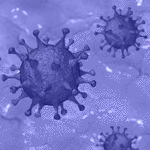Infection with the severe acute respiratory syndrome coronavirus-1 (SARS-CoV-2) has lead to diverse outcomes for COVID-19, with about 5-10% progressing to severe or critical disease. People not apparently part of the risk group (men, old age and presence of comorbidity) could however also develop severe COVID-19, but it was unknown what determined their susceptibility to severe disease. Recently, disturbance in type I interferons (IFN-I) has shed some light on why certain individuals may be at increased risk for severe COVID-19 disease. IFN-I describes a family of interferon cytokines that are important in the interference of viral spread and replication. Interferon signaling through its interferon receptor (IFNAR) results in the transcription of numerous genes, termed interferon stimulated genes (ISGs), that aid to further halt viral infection. A cluster of recent articles highlight different routes of altered IFN-I response results in severe COVID-19 disease.
In a cohort study of COVID-19 patients with different disease severities, Hadjadj et al. found that in patients with severe and critical disease an impaired IFN-I response was observed that was correlated with persistent viral load in the circulation and a heightened inflammatory response. To further understand if critical disease was based on inborn errors in the regulation of the IFN-I response, Zhang et al. screened specific loci on the basis of known association with life-threatening influenza pneumonia and other viral illnesses. They found inborn errors in the regulation of type I interferon immunity in at least 3,5% patients with life-threatening COVID-19 disease, resulting in loss of function. Bastard et al, found that a high proportion (10.2%) of auto-antibodies against IFN-I was present in life-threatening COVID-19 pneumonia and could be detected prior to infection. These autoantibodies were able to bind and block type I interferons and hereby affect SARS-CoV-2 infection in vitro. Wang et al. further showed a much broader auto-antibody repertoire in COVID-19 patients that affected other cytokines, chemokines, complement components and cell surface proteins resulting in exacerbated disease severity in a SARS-CoV-2 mouse model.
Interference in the IFN-I system via lowered IFN-I production, inborn errors altering the IFN-I response or autoantibodies against type I IFNs could provide an explanation for severe COVID-19 pneumonia in non-risk group individuals. Administration of type I IFN may be a therapeutic approach to adjust the diminished systemic levels of IFN-I. However, the presence of auto-antibodies against IFN-I, the already increased concentration of IFN-I at the site of inflammation and presence of mutations affecting IFN-I signaling, might not result in the desired result. Screening of IFN-I autoantibodies in patients (and convalescent plasma) might be beneficial in identifying patients at risk for severe disease.
Journal Articles:
- Hadjad et al, 2020. Impaired type I interferon activity and inflammatory responses in severe COVID-19 patients. Science.
- Bastard et al, 2020. Autoantibodies against type I IFNs in patients with life-threatening COVID-19. Science.
- Wang et al, 2020. Diverse Functional Autoantibodies in Patients with COVID-19. medRxiv.
- Zhang et al, 2020. Inborn errors of type I IFN immunity in patients with life-threatening COVID-19. Science.
Summary by Theo van den Broek
